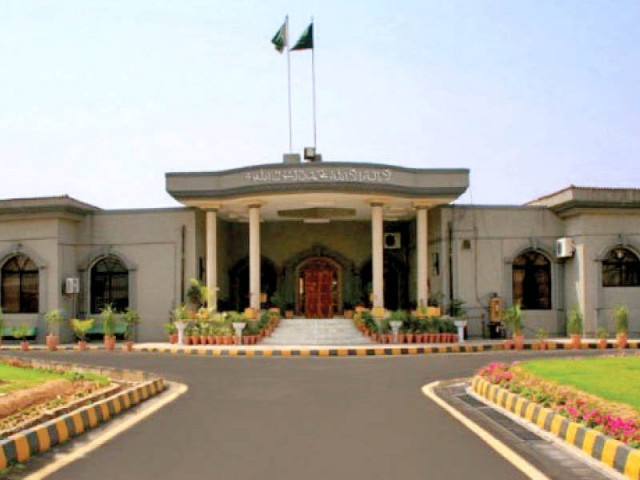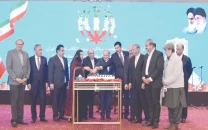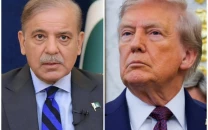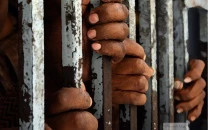IHC allows govt to crack down against sugar barons
Dismisses mills petition to further stay action on basis of sugar inquiry commission report

PHOTO: FILE
The court, however, noted that the federal cabinet’s decision to delegate its functions and powers to Special Assistant to the Prime Minister on Accountability Shehzad Akbar for taking action against those responsible for the sugar crisis is not in consonance with the law laid down by the Supreme Court.
The federal government had formed an inquiry commission to probe into a sudden shortage of sugar in January this year followed by a tremendous hike in price of the sweetener.
On April 5, the government unveiled the commission’s report which claimed that sugar mills belonging to the country’s top politicians including PML-N’s Shehbaz Sharif’s, PTI’s Jahangir Tareen and Khusro Bakhtiar and PML-Q’s Moonis Elahi were among the beneficiaries of the crisis.
In its report, the commission had accused the sugar mill owners of earning illegal profits to the tune of billions of rupees through unjustified price hikes, benami transactions, tax evasion, misuse of subsidy and purchasing sugarcane off the books.
On June 10, the Pakistan Sugar Mills Association (PSMA) and 17 other mill owners – including PTI stalwart Jahangir Tareen – challenged in the IHC both the inquiry commission and its report, claiming that legal formalities were not fulfilled in forming the probe panel.
IHC Chief Justice Athar Minallah on June 11 stopping the federal government from acting on the recommendations of the investigation report for ten days after representatives of the industry agreed to sell sugar at Rs70 per kilogramme. However, the bench on June 15 hinted at lifting the stay when it was told that sugar was not available to noncommercial consumers at Rs70 per kg.
When the court resumed hearing of the case on Saturday, Attorney General of Pakistan (AGP) Khalid Jawed Khan said it had become a tradition in Pakistan that the powerful members of the PSMA were also part of every government.
“It would be wrong to say that the commission of inquiry was set up to take revenge on political opponents. The inquiry is also being conducted against the government’s strong allies and friends, which is proof that this is not a biased operation,” he noted.
The AGP said the PSMA had objected to inclusion of the Inter-Services Intelligence (ISI) member in the committee. “The Supreme Court also constituted a Joint Investigation Team (JIT) in the Panama and fake accounts case that included ISI member.”
He said the inquiry commission on sugar worked under its terms of references (TORs) to cover all aspects of the sugar industry.
Justice Minallah, however, said the PSMA also has a problem with the government’s press conferences.
“Those who are in government do not need to hold such press conferences, as it affects the rights of the other party, inquiry and investigation. There should have been no such press conferences at all,” he said.
In his arguments, PSMA lawyer Salman Akram Raja referred to the case of cricketer Saleem Malik.
“The cricketer was accused of violating the International Cricket Council’s (ICC) code of conduct and he had not violated any law in Pakistan, but since there was no law in Pakistan regarding the allegations against him, an inquiry commission was formed,” said Raja.
However, he said, as all relevant laws on sugar are present in the country, there is no need to form an inquiry commission on government’s level. PSMA advocate Makhdoom Ali Khan also sought extension of the stay order. The court, however, refused to further extend the stay.
In its 4-page short order, it said constitution of the commission vide notification, dated 16.03.2020, read with notification, dated 25.03.2020 and pursuant thereto its proceedings and report, dated 21.05.2020 have not been found to be ultra vires the Pakistan Commission of Inquiry Act, 2017 nor in violation of the fundamental rights of the petitioners.
“The report, dated 21.05.2020 was, therefore, lawfully considered by the federal cabinet in its meeting held on 21.05.2020,” it added.
The court noted that the federal government is empowered under section 18(b)(i) of the National Accountability Ordinance, 1999 to send a reference to the National Accountability Bureau but such a decision has to be taken in accordance with the aforementioned law as expounded by the apex court.
Earlier, the court summoned the SAPM on accountability and the members of the commission.
The court also summoned cabinet division and homes secretaries, Punjab Anti-Corruption director general, the Intelligence Bureau deputy director, and representatives of the Security and Exchange Commission of Pakistan, the State Bank and the Federal Board of Revenue.



















COMMENTS
Comments are moderated and generally will be posted if they are on-topic and not abusive.
For more information, please see our Comments FAQ